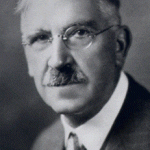 As part of the project “The return of the theorists” by Richard Ned Lebow, Hidemi Suganami and Peer Schouten I have written together with Peer Schouten a virtual interview with pragmatist thinker John Dewey. In the interview we discuss with Dewey, about his understanding of knowledge production and methods, politics, and language games. The interview is published as Theory Talks interview #100. Please read the full version here.
As part of the project “The return of the theorists” by Richard Ned Lebow, Hidemi Suganami and Peer Schouten I have written together with Peer Schouten a virtual interview with pragmatist thinker John Dewey. In the interview we discuss with Dewey, about his understanding of knowledge production and methods, politics, and language games. The interview is published as Theory Talks interview #100. Please read the full version here.
Category Archives: Publications
Book on International Practice Theory published
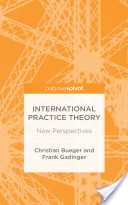 The book International Practice Theory: New Perspectives has now been published. It is co-authored with Frank Gadinger. Together we discuss what practice theory is, how it fits into international relations theory and explore core approaches and challenges with a particular emphasis on methodology. Here’s the official blurb
The book International Practice Theory: New Perspectives has now been published. It is co-authored with Frank Gadinger. Together we discuss what practice theory is, how it fits into international relations theory and explore core approaches and challenges with a particular emphasis on methodology. Here’s the official blurb
International Practice Theory has become one of the core perspectives in International Relations. Since the practice turn, there has been significant interest in developing new theories and methodologies for understanding world politics and global governance. This unique study reviews these new approaches, offering a focused discussion of the strategies, techniques and issues. Examining how International Practice Theory is linked to social theory and international relations theory, Bueger and Gadinger explore Bourdieu’s praxeology, the community of practice approach, narrative approaches, Actor-Network Theory and Boltanski’s pragmatic sociology to address core questions of transformation, scale, normativity and materiality. Advocating greater attention to translating International Practice Theory into empirical research, this book will be a valuable resource for all those interested in social theory, practice theory and the international.
A preview of the book is available here.
Chapter on the role of expertise in IR published
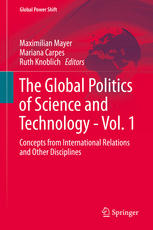 My book chapter which discusses the different way of how expertise in international relations has been studied is now available in print and online as part of the Handbook “The Global Politics of Science and Technology”. It will be an interesting read for anyone interested in the role of experts, politics and knowledge production as well as international organizations. The chapter provides an historical overview and argues that there are three generations of studying expertise in international relations.
My book chapter which discusses the different way of how expertise in international relations has been studied is now available in print and online as part of the Handbook “The Global Politics of Science and Technology”. It will be an interesting read for anyone interested in the role of experts, politics and knowledge production as well as international organizations. The chapter provides an historical overview and argues that there are three generations of studying expertise in international relations.
The role and functions of expertise in international politics is, since decades, a core research theme. This chapter outlines a history of how the relation between science and international politics has been approached through the lenses of expertise. My intention is to offer a heuristic device. I argue that the debate can be structured in three generations. A first generation is interested in experts as actors that have a causal influence on international politics. The second generation scrutinizes discourses of expertise and their constitutional role in making the international. And the third generation concentrates on practices of expertise and the way these perform the epistemic arrangements of the international. To think about the study of expertise in the frame of three generations each offering different insights and carrying advantages and problems provides not only a practical tool for sorting ideas, but clarifies what one ‘buys in’ by following a specific generation.
The chapter is either available here or as pre-print here.
Article on the Methodology of Practice Theory published
 What are the methodological consequences of the practice turn? In my article just published with European Political Science Review, I explore the challenges that studying practices pose and which research strategies and methods are available for the study of practice. The article is available as open access here. Here is the abstract:
What are the methodological consequences of the practice turn? In my article just published with European Political Science Review, I explore the challenges that studying practices pose and which research strategies and methods are available for the study of practice. The article is available as open access here. Here is the abstract:
Political scientists have started to focus on ‘practice’ as the smallest unit of analysis. Following a broader turn in the social sciences, the practice focus provides multiple advantages, including better conceptualizations of short-term social change, getting closer to the everyday activities of those speaking, writing and doing politics, appropriate conceptualization of agency-structure dynamics, or forms of analysis resonating with other communities than scholarly ones. This contribution asks what the methodological implications of the practice turn are. It is argued that the practice focus does not only imply a certain ‘theory’ but also a certain methodology. I advance the term praxiography to speak about the forms of analysis produced by practice researchers. I discuss key guidelines of praxiographic research on two levels: first, general research strategies that provide empirical access points, second, guidelines for data collection in the frame of participant observation, expert interviews, and document analysis. I conclude in arguing that although praxiography is context driven, and hence requires to be tailored to the research problem, it is vital to reflect on the methodological repertoire of praxiographic research.
Conference on Future Challenges of Maritime Security
Maritime Security is a complex, interconnected challenge and addressing it requires close cooperation and coordination among different agencies, including the navies. On April 1st and 2nd I participated in a conference organized by the Naval Staff Strategy Unit and the Global Directions program of Merton College Oxford which aimed at discussing how to rise to these challenges. The conference drew together a range of participants from think tanks, universities, NGO’s, IO’s and navies to ask which strategies can be developed for navies in a maritime security environment. In the conference different regional theaters, including the Gulf, the Mediterranean, or the Gulf of Guinea were discussed as well as the broad range of maritime security issues, stretching from illegal migration and fisheries crime to piracy and climate change were debated. In my own contribution I drew on a recent article published in African Security to ask how a maritime strategy can be build around the task of the facilitation of maritime security communities. Building maritime security communities is a viable end for maritime security strategy. Two core challenges however arise, firstly, the problem of overlap and regime complexity, and, secondly, how to ensure ownership and and organic growth of security communities.
Article on Methodology of Practice Theory Online
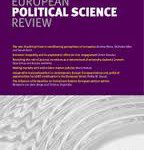 My article titled “Pathways to Practice: Praxiography and International Politics” is now online available as open access on the European Political Science Review website. The article addresses the question what the methodological implications of the practice turn are. Arguing that praxiography is the best label to describe the methodology of practice theory I discuss research strategy as well as different methods to capture practice. The article intends to offer guidelines for those interested in writing a praxiography as well as makes the argument that practice theory requires a genuine methodological discourse.
My article titled “Pathways to Practice: Praxiography and International Politics” is now online available as open access on the European Political Science Review website. The article addresses the question what the methodological implications of the practice turn are. Arguing that praxiography is the best label to describe the methodology of practice theory I discuss research strategy as well as different methods to capture practice. The article intends to offer guidelines for those interested in writing a praxiography as well as makes the argument that practice theory requires a genuine methodological discourse.
New Book Chapter: The Organizational Field of Counter-Piracy
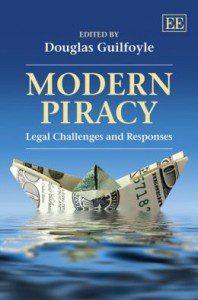 The edited volume “Modern Piracy. Legal Challenges and Responses” edited by Douglas Guilfoyle has been published by Edward Elgar. The book includes several contributions from international maritime lawyers and gives a broad and in-depth overview of the various legal challenges that arise in counter-piracy. In my own chapter, titled “Responses to Contemporary Piracy: Disentangling the Organizational Field” I argue that an organizational field of counter-piracy has emerged and provide an overview of the practices that drive the field. The chapter intends to give an overview of the diverse set of counter-piracy practices from a theoretically informed perspective.
The edited volume “Modern Piracy. Legal Challenges and Responses” edited by Douglas Guilfoyle has been published by Edward Elgar. The book includes several contributions from international maritime lawyers and gives a broad and in-depth overview of the various legal challenges that arise in counter-piracy. In my own chapter, titled “Responses to Contemporary Piracy: Disentangling the Organizational Field” I argue that an organizational field of counter-piracy has emerged and provide an overview of the practices that drive the field. The chapter intends to give an overview of the diverse set of counter-piracy practices from a theoretically informed perspective.
Roundtable on Special Issue: The Global Fight Against Piracy

Together with the journal Global Policy and the Greenwich Maritime Institute I organize a launch event to discuss the special section on Contemporary Maritime Piracy. The special section discusses the problem of piracy from different disciplinary perspectives and is the outcome of a workshop held in London in 2011. Confirmed panellists for the event include Professor Christopher Bellamy, (Director of the Greenwich Maritime Institute) Dr Christian Bueger (Cardiff University), Dr Douglas Guilfoyle (University College London), Dr Axel Klein (University of Kent), Dr Anja Shortland (Brunel University), as well as representatives from the maritime security sector. Further information on the event is available here.
Book Chapter on Macrosecuritization and Counter-Piracy Practice is out
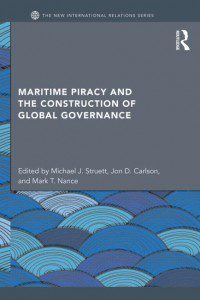 A new edited volume studies contemporary piracy from an (IR) constructivist perspectives and focuses especially on international institutions. The book titled Maritime Piracy and the Construction of Global Governance is edited by Michael J. Struett, Mark T. Nance and Jon D. Carlson and is the outcome of a 2011 workshop sponsored by the International Studies Association. In the chapter I contributed (together with Jan Stockbruegger) we investigate in how far the community of counter-practices can be understood as an alliance or a security community. Drawing on Buzan and Waever’s macrosecuritization framework we ask how actors collaborate and whether they share securitizations.
A new edited volume studies contemporary piracy from an (IR) constructivist perspectives and focuses especially on international institutions. The book titled Maritime Piracy and the Construction of Global Governance is edited by Michael J. Struett, Mark T. Nance and Jon D. Carlson and is the outcome of a 2011 workshop sponsored by the International Studies Association. In the chapter I contributed (together with Jan Stockbruegger) we investigate in how far the community of counter-practices can be understood as an alliance or a security community. Drawing on Buzan and Waever’s macrosecuritization framework we ask how actors collaborate and whether they share securitizations.
New Publication
Our critique of contemporary counter-piracy strategy and the need to apprehend piracy as a peacebuilding problem has been published as a Report of the Institute for Development and Peace (INEF), Duisburg (in German only). The Report co-authored with Jan Stockbruegger (U Leiden) and Sascha Werthes (U Duisburg) can be downloaded here